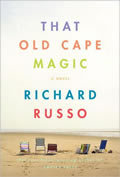Because our society doesn’t generally pay well for creativity, many people who aspire to act, sing, paint or write have a day job to pay the bills.
They might aspire to that glorious day when they’re discovered and can quit the practical job, supporting themselves solely on their art.
Richard Russo, a Pulitzer prize winning novelist, got to do just that, retiring from his post as an English professor when he was 47 to pursue writing full time. But in this video interview, Russo discusses how the other things he’s done, including teaching and writing screenplays, have helped him as a novelist — they weren’t merely distractions or simple ways to support himself, but they helped inform who he is creatively.
[youtube=http://www.youtube.com/watch?v=h_M2BYYB8f0]
He wrote an essay on Powells.com when Bridge of Sighs came out, answering why it took six years to finish. He explains that among other things, he was working on the screenplay version of his previous novel, Empire Falls, and discusses how writing screenplays influences his novels.

I cheerfully admit that part of the reason I’ve enjoyed writing movie scripts is that they play to my particular storytelling strengths: characters developed by means of dialogue and action/behavior. Even as a novelist I like to slow time down, let my story develop from one scene to the next. Screenwriting puts a premium on precisely these skills. What comes less naturally to me are narration (which typically speeds up time by summarizing events), character development by means of entering their private thoughts, and descriptions of the physical world in which the action takes place. These are all essential skills for a novelist but are of little use to a screenwriter. The camera can see in a split second what would take the writer several pages to describe, and what characters are thinking has to be in their dialogue or the expressions on the actors’ faces. The last time I dealt with the passage of movie time through a montage, the director gave me withering look and said, “I hate fucking montages!” Far better, he believed, to insert a card at the bottom of the screen reading, “Two Months Later.”
For all of these reasons writing screenplays is a little like sitting down to a meal that contains just the foods you like best, the ones that are good for you having been, by some stroke of good fortune, actually forbidden. It’s great for awhile, but after a few months you develop rickets. When I return to novel writing after doing a screenwriting stint, I’m overwhelmed by the great variety and abundance of the feast I’ve been ignoring. My God, are those brussel sprouts? Bring them on. Liver? You betcha. The result is fiction that’s more lush, not more spare. The two books I’ve published since I started dividing my time between novels and movies — Empire Falls and Bridge of Sighs — are my least “movie-like,” devoted as they are to the passage of time, to their characters’ interiors, to the physical worlds they inhabit. If anything, I’ve become even more expansive, digressive and self-indulgent than before. I recall finishing one long narrative passage in Empire and thinking, “There. I pity the poor dumb screenwriter who has to find the film equivalent of that!” Who turned out, of course, to be me.
Richard Russo is one of my favorite writers. His books have compelling plots, interesting characters, believable dialogue, a great mix of drama and comedy. I want to interview him for my blog. Anyone want to introduce me?

